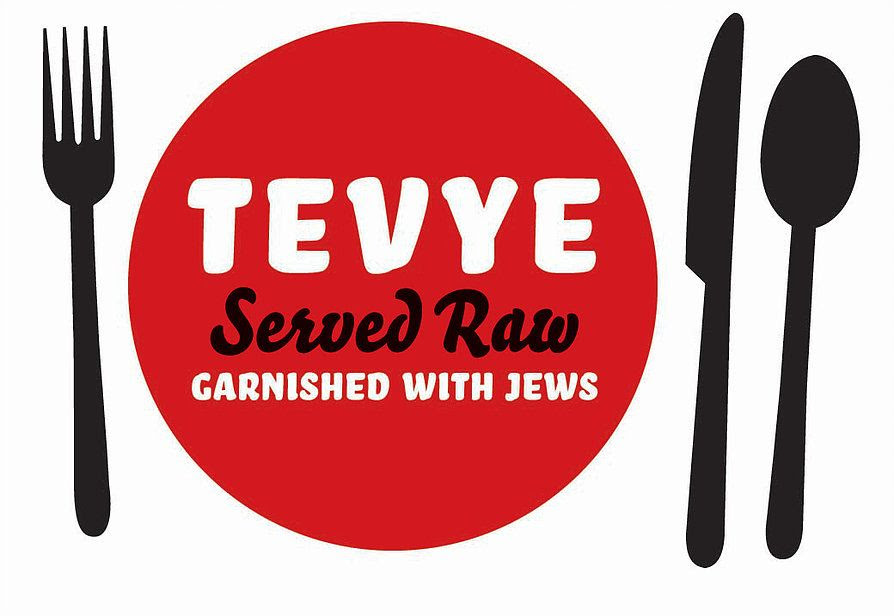Me tor nisht farzindikn…
Greetings from ever-so-slightly-warmer-than-
Among the things we’re thankful for today at the Congress for Jewish Culture are a new office and bijou theater which we faryidisht just this month with the world debut of our Avrom Sutzkever evening Dortn vu es nekhtikn di shtern, to sold out houses and great acclaim. Now that we have a space again after 5 years of difficult na-venad, look for us to be creating boutique events celebrating new Yiddish culture!
Dortn will be returning in December and January to mark Sutzkever’s 10th yortsayt, but first, lekoved Khanike, we’re bringing back Tevye Served Raw for a single day––two shows only––on December 23rd. Treat family and friends, or even just yourself, to this theatrical gem for a beemes likhtikn Khanike:
Other news
Those of you who were lucky enough to attend the Dortn premiere saw several works on display by Yiddish poet and artist Yonia Fain. Yonia was close with the Congress for many years, acting as co-President and editing our journal Di Zukunft. He left behind a trove of his works for which we are seeking homes, so imagine our pleasure when Yevgeniy Fiks took up the cause and made a shiddukh to display a selection of Yonia’s works as part of the exhibition Portable Landscapes: Memories and Imaginaries of the Refugee Modernism now through February 15th, 2020, at the James Gallery of the CUNY Graduate Center. Free and open to the public, see here for dates and hours! If you would be interested in making a special visit to the exhibition with me on Saturday, December 14th at 2 PM, drop me a line by responding to this email. I’ll talk a bit about Yonia’s story and read a couple of his poems.
We’re also pleased to announce that Rokhl Kafrissen is now on the team as our Director of Communications and Special Events. She’s got a few exciting irons in the fire, so look to be hearing more in the near future.
A new office, a new staff member, theater and classes––it takes substantial money to keep this kind of activity going, so we hope that you’ll join the team, too, by chipping in a few bucks this Giving Tuesday (or whenever you feel like it!) to help us keep bringing you new Yiddish culture. We’re a small organization with a small budget, so every little bit helps!
And now for some interesting things our friends have produced or are up to…
Yiddish New York!
The Congress is happy to partner with Yiddish New York (www.yiddishnewyork.com) – the nation’s largest workshop/festival of Yiddish culture, returning December 21-26, 2019 to the 14th Street Y in Manhattan. The only festival of its kind on American soil, YNY is a six-day gathering of klezmer music, Yiddish culture, song & folk dance, theater, lectures, language, workshops, performances, visual arts, and film, with affordable programs for adults, kids and teens! To receive a 10% discount on 6-day registrations, enter the code “YNY10” when registering online.
Some gift recommendations:
MUSIC
Klezmer punk anyone?
Geoff Berner: Grand Hotel Cosmopolis
If you were lucky, you heard her aria in Dortn vu es nekhtikn di shtern, now hear her with a band!
Amanda Miryem-Khaye Seigel: Toyznt Tamem
ANOTHER Yiddish Grammy nomination?? Yup!
Alex Weiser: and all the days were purple
Founder of the new media empire OU People
Michael Winograd: Kosher Style!
BOOKS
Elissa Bemporad
Legacy of Blood: Jews, Pogroms, and Ritual Murder in the Lands of the Soviets
Bemporad’s book analyzes the role of the genocidal violence unleashed during the pogroms in shaping the relationship between Jews and the Soviet state, tracing the persistence and permutation of the blood libel in the atheistic Soviet Union throughout the interwar period and into the postwar period. Bemporad reasseses the interplay between official and popular antisemitism in the USSR from 1917 to the early 1960s.
Alyssa Quint
The Rise of the Modern Yiddish Theater
Alyssa Quint focuses on the early years of the modern Yiddish theater, from roughly 1876 to 1883, through the works of one of its best-known and most colorful figures, Avrom Goldfaden. Goldfaden (né Goldenfaden, 1840-1908) was one of the first playwrights to stage a commercially viable Yiddish-language theater, first in Romania and then in Russia. Goldfaden’s work was rapidly disseminated in print and his plays were performed frequently for Jewish audiences. Sholem Aleichem considered him as a forger of a new language that “breathed the European spirit into our old jargon.” Quint uses Goldfaden’s theatrical works as a way to understand the social life of Jewish theater in Imperial Russia. Through a study of his libretti, she looks at the experiences of Russian Jewish actors, male and female, to explore connections between culture as artistic production and culture in the sense of broader social structures. Quint explores how Jewish actors who played Goldfaden’s work on stage absorbed the theater into their everyday lives. Goldfaden’s theater gives a rich view into the conduct, ideology, religion, and politics of Jews during an important moment in the history of late Imperial Russia.
Moyshe Rozenbaumas
The Odyssey of an Apple Thief
With an enchanting eye for detail, Moishe Rosenbaumas tells a lesser known story out of the Holocaust: escape to Russia from Lithuania, heroic service in the Red Army, hair-raising escape from the Soviet Union and successful resettlement in France. His is a fresh and unique voice and his book deserves recognition as a literary masterpiece in the library of Jewish memoir literature of the twentieth century.”—David Biale, Emanuel Ringelblum Distinguished Professor, University of California, Davis
David Slucki
Sing This at My Funeral: A Memoir of Fathers and Sons
for a special limited-time 40% discount, use the code HOL9
Slucki’s memoir of his grandfather Jakub and his father Charles “Sluggo” Slucki. In 1978, Jakub Slucki passed away peacefully in his sleep at the age of seventy-seven. A Holocaust survivor whose first wife and two sons had been murdered at the Nazi death camp in Chelmno, Poland, Jakub had lived a turbulent life. Just over thirty-seven years later, his son Charles died of a heart attack. David Slucki’s Sing This at My Funeral: A Memoir of Fathers and Sons tells the story of his father and his grandfather, and the grave legacy that they each passed on to him. This is a story about the Holocaust and its aftermath, about absence and the scars that never heal, and about fathers and sons and what it means to raise young men.



Leave a Reply